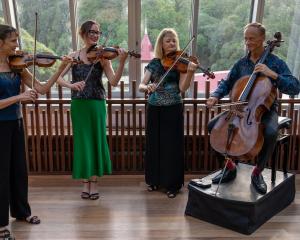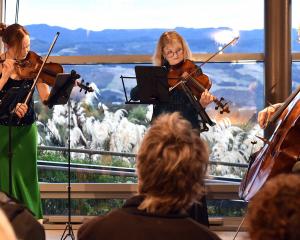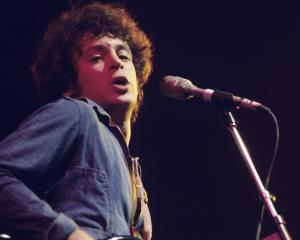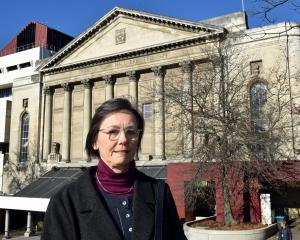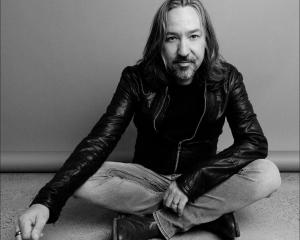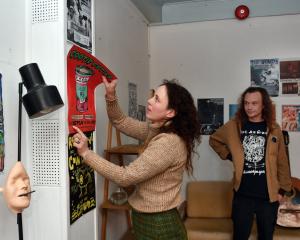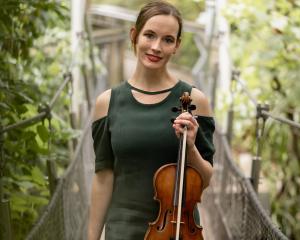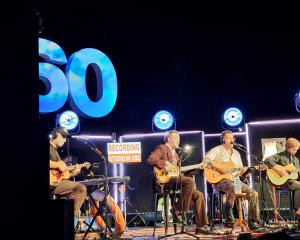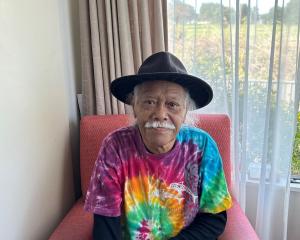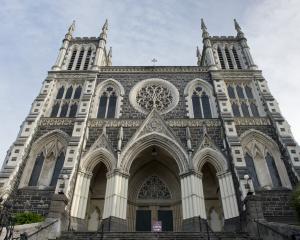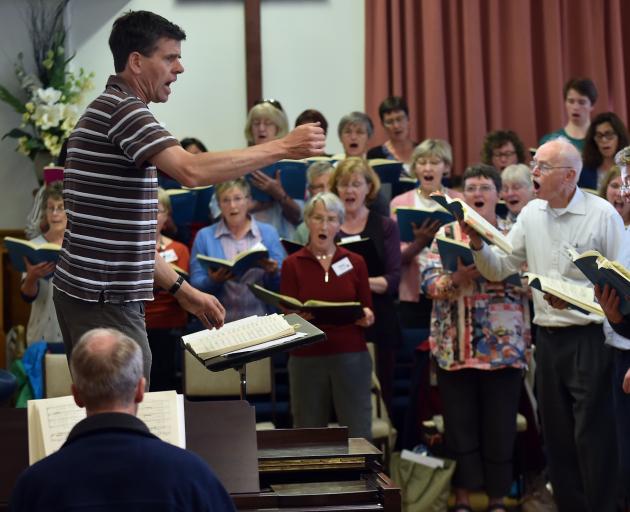
It has been a year of milestones for David Burchell — 20 years of directing the Dunedin City Choir and the 100th birthday of Norma, the Town Hall organ he has played for many years.
Not that he is worried about ‘‘artificial’’ numbers. No matter what the year is, he aims to produce interesting and varied performances for Dunedin audiences.
‘‘It’s just a stepping stone. It’s been a busy year. I’ve enjoyed it very much but I want to make sure next year is just as exciting, even without any artificial numbers to hang it on.’’
That includes making the upcoming Dunedin City Choir’s two-yearly performance of Messiah — Burchell’s 10th — fresh and exciting. This year it will also feature the University of Otago’s new voice teacher alto Tessa Romano, soprano Rebecca Ryan, tenor Andrew Grenon and bass Joel Amosa.
‘‘It’s an interesting challenge.’’
Ever since taking up the role of the choir’s musical director and conductor, Burchell has conducted the performance from the harpsichord for some of the solo movements — a tradition that is as old as the music and how composer Frideric Handel would have conducted the piece in Dublin and London in the 1700s.
‘‘The idea of a conductor being a separate figure who doesn’t do anything physically to produce a sound is a later convention.’’
He finds the harpsichord — an instrument he learnt as a student studying organ in the United Kingdom — adds variety in sound to the Messiah alongside a chamber organ.
‘‘It also gives me more influence on the style in which they play. The harpsichord, as well as producing harmony, is quite a strong instrument, so I would give some rhythmic input into the style I wanted to play.’’
Burchell enjoys the chance to be ‘‘hands on’’ in a concert for a change. He also tunes the harpsichord and sets up the organ.
‘‘It’s nice not to just swan in as a conductor.’’
Keeping the performance fresh, as it was a regular on the calendar, was also a challenge but unlike some choirs City Choir did not perform it multiple times a year.
‘‘I do find myself saying the same things every time. I like to bring people back to the text, which was Handel’s starting point. If you understand how the text drives the music, you can get the best out of both of them.’’
But it was not always that easy. Burchell came to Dunedin from the United Kingdom to conduct the St Paul’s Cathedral Choir, and the City Choir position made the move possible.
‘‘One without the other and I probably wouldn’t have moved here. As far as City Choir is concerned I’ve never looked back.’’
The city choir was a ‘‘strange body’, an amateur organisation with professional aspirations and professional relationships with other musicians and musical groups.
‘‘At the same time, it is a group of people who like singing together and they don’t do it for money.’’
This meant it had a membership of singers with a ‘‘great sense of ambition’’ coupled with good-natured camaraderie.
‘‘It’s always been a group of people who have sought to achieve the best they can.’’’
There was also a core of members who made sure the choir was on a solid financial foundation, which had made his ‘‘life a lot easier’’.
‘‘It’s difficult to conceive of another group with such a strange balance of professional versus amateur.’’
The choir was still going strong and continued to attract new members, although male singers were getting harder to come by.
‘‘The ranks are getting a little thin a bit in the men, which is a concern for the future.’’
It typically attracted singers whose parental duties had eased enough for them to pursue their own interests again, although a few younger singers often joined the ranks for a short time while studying here.
He had noticed the choir had become more accomplished at learning music ‘‘a little quicker’’ than it used to.
‘‘The first few years were a building process. In the last 10 years we have had reached a really good operating level for the group.’’
‘‘I’ve got a good gauge of what they can handle and I’ve got a good gauge for the style of music they find straightforward and those they find challenging.’’
While the style of music which challenged the choir could often surprise him, it had become adept at works considered difficult, such as Bach.
‘‘We’ve sung so much they are now instinctive; their music instincts are in tune with his style.’’
However, some contemporary pieces or even mainstream classical pieces members are not familiar with can be challenging for them to start with.
‘‘It’s quite interesting.’’
Messiah is a bit like that, but as members performed it cyclically it was stored in their long-term memories.
It was a juggle for Burchell to get any new members up to speed with the piece while not boring longer-term members.
‘‘It’s great music to sing, so people don’t complain about rehearsing it. They enjoy singing something they know really well.’’
A special accomplishment for the choir was the invitation to perform last year in the British premiere of Ritchie's oratorio Gallipoli to the Somme in London.
The work, with text from World War 1 poets and writers, was commissioned by the Dunedin Symphony Orchestra (DSO), and premiered in the Dunedin Town Hall in 2016.
The choir is also continuing to look at new and innovative projects similar to the Jazz Cafe it did last year.
‘‘For next year I’ve been working on a programme that includes three contemporary choral pieces by composers beginning to make a name for themselves around the world.’’
It was a balance between finding something the choir enjoyed singing and the audience responded to.
‘‘There is plenty around the fringes to get excited about.’’
MESSIAH
1741: Frideric Handel starts composing Messiah. He completes the 260-page score in 24 days.
1742: First performed in Dublin.
19th century: Large-scale performances become popular.
1857: Great Handel Festival held in Crystal Palace.
1965: New edition of the score by Wakins Shaw published.
SEE IT
Handel’s Messiah, conducted by David Burchell and performed by City Choir Dunedin, Dunedin Town Hall, Tuesday, December 10, 7.30pm.

